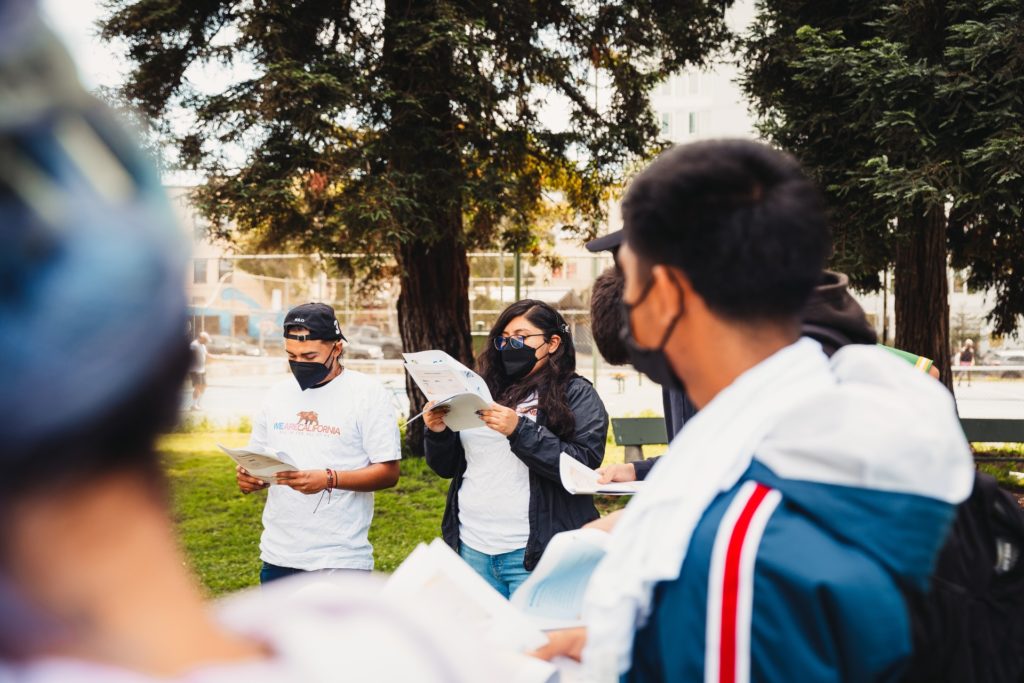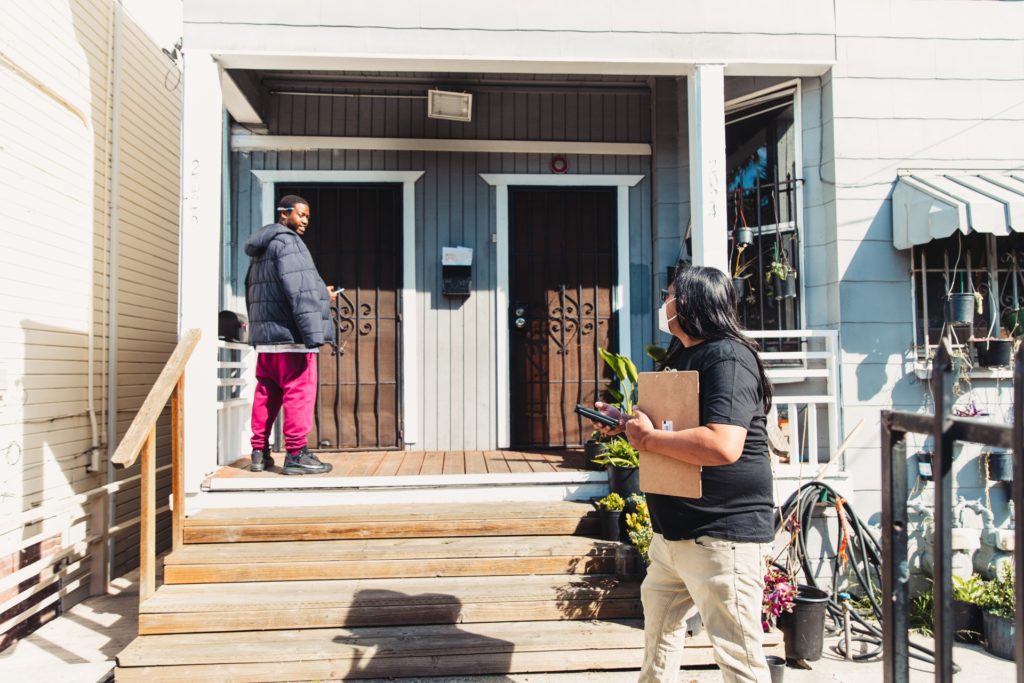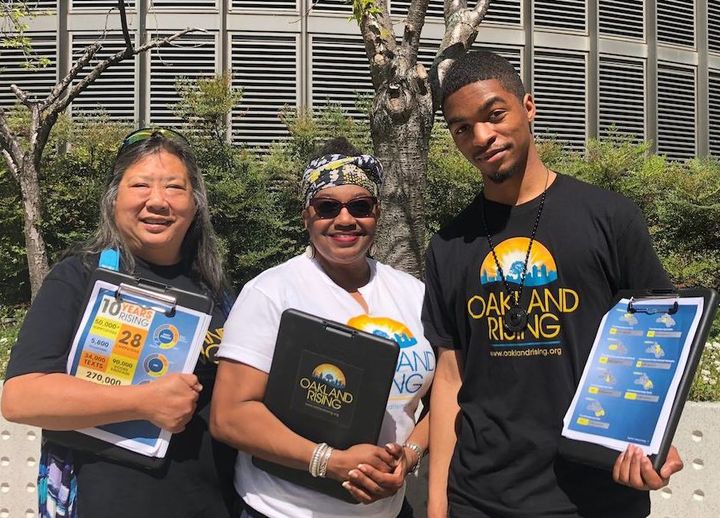In a few weeks, voters in Oakland, California will start to receive their ballots in the mail for the November 8 general election. One of the questions they’ll be deciding on is the Oakland Fair Elections Act, a measure that would bring a new public campaign financing program to city elections, as well as lower campaign contribution limits in city races and increased transparency of campaign donors.
The effort to place the fair elections measure on the ballot was launched in March, with local outreach by the Bay Rising alliance of community organizations in a coalition with democracy reform groups including California Common Cause and the League of Women Voters of Oakland.
During a July 11 meeting, the Oakland City Council discussed reports on the measure, including recommendations from three council members and a supplemental report from the Oakland Public Ethics Commission, an independent oversight body composed of city residents. In a unanimous vote by the six council members who were present, the measure got the go-ahead to face voters. It will be called Measure W on the ballot.
The centerpiece of the Fair Elections Act is the creation of “Democracy Dollars” for Oakland elections, a public campaign financing program similar to one that recently completed its third cycle of use in Seattle. Under the program in Oakland, just as in Seattle, four vouchers valued at $25 each would be mailed to every registered voter in the city, which they could donate to candidates for city offices who opt-in to the program. Candidates who opt-in would first need to qualify by reaching a threshold of qualifying small-dollar contributions, then by agreeing to limit their total campaign spending, limit their household’s out-of-pocket campaign spending, and participate in public debates, among other requirements.
There’s excitement among voters that the Fair Elections Act will put them at the center of elections and campaigning in the future.
liz suk, executive director, Oakland Rising and Oakland Rising Action
The program aims to enable candidates to run for city office who don’t already have a wealthy donor network or support from deep-pocketed business groups.
A report prepared this year by the civic technology nonprofit MapLight found that just half of all campaign contributions in Oakland since 2014 came from city residents, and that those donations mostly came from the whitest and most affluent areas of the city
Last year in Seattle, residents donated vouchers to local candidates in record numbers according to city data, and studies show the program is spurring participation among communities that traditionally had not been as active in cash donations. Toward the democracy voucher programs’ goals of broadening the donor base, Seattle voucher users now look similar to the city’s population in terms of age, income, and race, the latest research by Associate Professors Jen Heerwig of Stony Brook University and Brian J. McCabe of Georgetown University shows.
The multiracial collaborative group Oakland Rising, part of the coalition supporting Yes on W, has stayed active in grassroots outreach since the measure qualified for the ballot, highlighting how it can amplify the voices of voters in marginalized communities and curb the influence of wealthy campaign funders.
“We’re in the thick of our campaigning and now bringing in endorsements from community organizations,” liz suk, executive director of Oakland Rising and Oakland Rising Action, told Sludge. “There’s excitement among voters that the Fair Elections Act will put them at the center of elections and campaigning in the future—they want to see that they’re a central part of the electoral process, and that candidates see them as an important part of winning and bringing power for policies and changes to their communities.”

Oakland Rising Action’s suk said the group has been phone-banking and holding volunteer walk days for the measure. “Right now, much of our outreach is to low-propensity voters in the flatlands—those are the folks that people say don’t vote, but they don’t vote because no one comes to talk to them about voting. Candidates talk to high-propensity voters and to those who contribute to their campaigns. Folks in the flatlands are looking forward to the implementation of the ‘Democracy Dollars’ program so candidates will see them as an important part.
“When we talk about what it would mean to give four vouchers, folks are really excited about that, ‘I get to use this to give to a campaign,’” suk said. With voters’ interest piqued, suk says, group volunteers follow-up with text messages to provide more information about how the program would work.
As in Seattle’s program, Oakland would create and maintain a public-facing website with data on every Democracy Dollar given, with information on totals raised by participating candidates and electronic access to campaign statements.
The Oakland Fair Elections Act would lower the maximum campaign contribution amount in city races from $900 to $600, encouraging greater use of Democracy Dollars by candidates and voters alike. The measure would also require campaign ads to list the top three contributors to the ad’s sponsor, while expanding disclosure requirements for campaigns and mandating that groups making independent expenditures file reports with the Public Ethics Commission.
The top-spending groups in Oakland elections in recent cycles were funded predominantly by Michael Bloomberg, the billionaire donor behind a pro-charter school group that spent $920,000, and transportation company Lyft, which spent $439,000, according to MapLight.
In Oakland, where this year the offices of mayor, city auditor, and city council are up for election, outside spending by corporate interests remains prevalent. With Oakland Mayor Libby Schaaf term-limited, 10 candidates will appear on the ballot for mayor, including Ignacio De La Fuente, a former councilmember from 1999 to 2013. While De La Fuente is not among the fundraising leaders, his bid received a hand up early in September, according to the volunteer group No Coal in Oakland, from a pair of $50,000 donations made to an independent committee, Californians for Safer Streets Supporting Ignacio De La Fuente, which was set up the month before by a coal lobbyist. The two donors, found in state campaign finance reports by Oakland reporter Jaime Omar Yassin, were Jonathan Brooks, a hedge fund executive with a likely interest in a proposed coal terminal site, and a shell company of Phil Tagami, a prominent real estate developer behind the proposed terminal.
Independent expenditure committees spending on ads like political mailers would need to include the line, “Funding details are available on the Oakland Public Ethics Commission’s website,” offering access to information about the ad’s sponsor, as well as contributions the sponsor has made of $100 or more in the current year to city candidates or ballot measure committees. The independent Public Ethics Commission would be empowered with staff to oversee compliance with the act.
The Bay Area real estate industry is also spending well into the six figures on ballot measures soon facing Oakland voters. Oaklanders Together, a coalition of business groups and the Oakland Metropolitan Chamber of Commerce, has raised $608,000, according to city records compiled by the volunteer transparency resource Open Disclosure, including $75,000 from real estate development firm TMG Partners. Expenditure data from the Oakland Public Ethics Commission details tens of thousands of dollars spent by Oaklanders Together on petitioning, political data, and market research. This year, Oakland voters will consider ballot measures on business tax rates, eviction protections, an $850 million Affordable Housing and Infrastructure Bond, council member term limits, and more.

The Fair Elections Act would roll out “Democracy Dollars” by augmenting the Public Ethics Commission with four staff people and resources to administer the program, including a way for voters to donate their vouchers electronically. Funding for participating candidates redeeming vouchers would be disbursed by a new Democracy Dollars Fund, seeded with $4 million for each two-year election cycle. While Seattle’s voucher program was financed with a property tax approved by city voters, Oakland’s would be paid for from the general fund. If Measure W is approved, the Democracy Dollars’ funding would be appropriated for the budget beginning July 1, 2023.
In addition to the Yes on W coalition groups like Bay Rising, suk said more Oakland groups have recently added their names as endorsers: Local 1021 of the Service Employees International Union (SEIU), the Alameda County Democratic Party, the nonprofit and nonpartisan California Clean Money Campaign, and Causa Justa :: Just Cause, a grassroots organization of low-income San Francisco and Oakland residents. Other Oakland-based nonprofits joined in support, including the Ella Baker Center for Human Rights, Communities United for Restorative Youth Justice, and Mujeres Unidas y Activas, a grassroots organization led by and for Latina immigrant women. Some national organizations that endorsed Yes on W, suk said, include the Sierra Club, Public Citizen, RepresentUs, and progressive Jewish group Bend the Arc.
Early voting at vote centers in Alameda County is set to begin on October 10. Advocates of voucher programs in other California cities, like the group Los Angeles for Democracy Vouchers and a coalition in San Diego, are following the upcoming Oakland vote in their efforts to offer versions in their cities.
The Oakland campaign is gaining momentum heading toward Election Day, suk says, as they talk to more voters across the city.
“What we’re looking forward to with Democracy Dollars is that candidates will see that the power actually lies in the majority of Oakland who live in the flatlands, working-class, poor communities of color, immigrant, impacted by the criminal justice system,” suk said. “That if they engage those people, we could build a city that is equitable and build an Oakland for all.”


